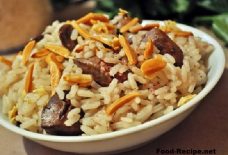Salam from Gaza
By Leen Abu Said, from We Are Not Numbers
Salam is a noun in Arabic that mainly means “peace,” and it can be used in many different contexts. When roaming the streets of Gaza, it is not weird to hear this word, salam, often—and possibly more than any other word. For example, when I used to walk home from the university with my friends, I would leave them by saying “Salam, guys!” Then I would enter the house and greet my family with “Salam everyone!” If I was lucky and my wonderful mom surprised me with maklubeh, a famous and delicious Palestinian dish, I expressed my pleasure by saying, “Ya salam. I loved it. Thanks mom!” (The word ya is close to the English expression “Oh.” It also is used as an attention-getter when calling a person’s name.) I would then change my clothes and shower after an exhausting day at college, looking forward to taking a nap and enjoying a time of salam, peace and quiet. Then I would wake up and make a cup of tea to sip while reading the news on Facebook.
Facebook’s standard question, “What’s on your mind?”, prompted me one day to ask my friends in Gaza, “What’s peace for you?” I hoped they would share their thoughts with me freely.
Mahmoud defined it as, “It is when you find yourself comfortable in a place you prefer, or when you do what you like—the things that make your mind calm.”
Linda said, “It’s when I’m going home on a rainy day, looking at the sea from the window of a car, or listening to a good song and knowing that mom is waiting for me.”
Nadeen, Besan and Sulaiman responded that there is nothing better than seclusion, especially from social media, when they want to enjoy their own space peacefully. Dima is a free soul who feels satisfied when doing things in her own way and away from external pressure. Maryam and Safa find salam in prayers.
On the other hand, Elizabeth loves to share moments of “elation” with friends at the few musical festivals and parties held in Gaza.
All of these answers contrast sharply with Bayan’s cynical words: “Peace is a lie we tell kids to cling to, so they don’t find out how cruel and savage the world is at a young age. You find it in kids’ minds and beauty queens’ answers.” Lama had a similar response: “To me, peace is a myth. It doesn’t really exist.” And Hanin wrote, “Ironically, I live peacefully when I don’t think about peace, so I’m not going to compare the idea of peace with the reality on the ground”.
For sure, you cannot find salam in the racist hate speeches so common against minorities these days nor in the greedy and selfish government policies that oppress them.
Salam—peace—is clearly much deeper than a word. It’s the motivation that led Martin Luther King Jr. to advocate for his dream of freedom. It’s the spark in Nelson Mandela’s smile and the impulse behind Mahatma Gandhi’s wisdom. It’s in the olive branch that Yasser Arafat, the first president of the State of Palestine, held throughout his life. It’s in the white flag of unarmed civilians during war when they seek safety, even if the situation is hopeless.
Palestinian culture is rich in expressions of the concept of salam. I think it’s a universal concept that reflects our inherently free minds and kind hearts, in Palestine and beyond. So from Gaza, I say to you, salam alaikom, peace be upon you.








